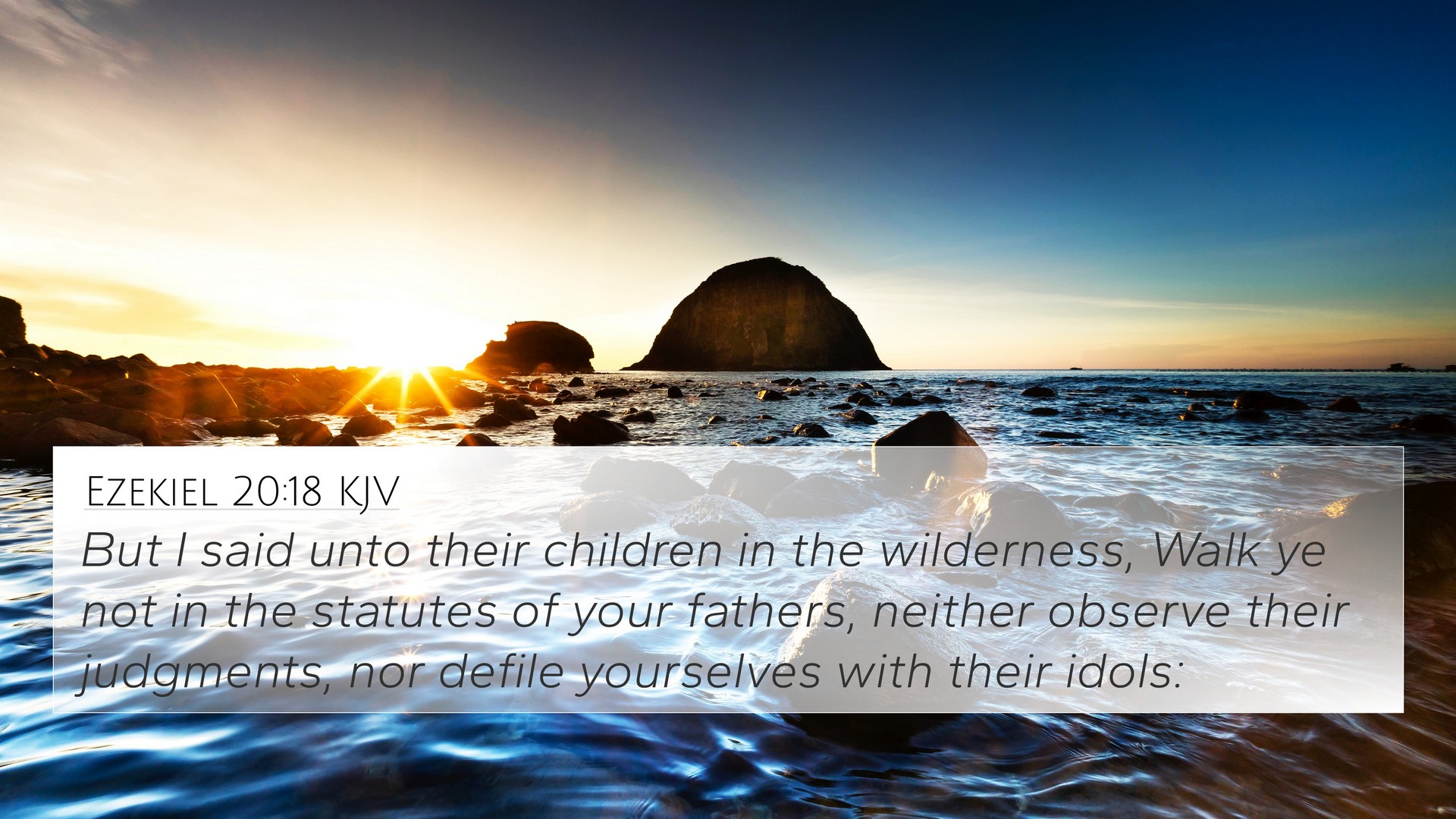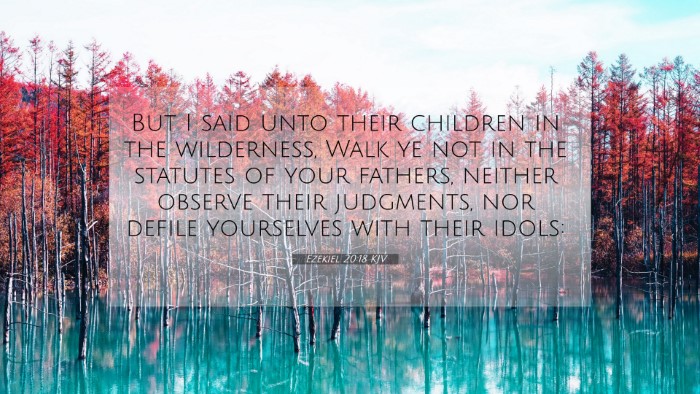Ezekiel 20:18 - Verse Meaning and Interpretation
Ezekiel 20:18 states: "But I said to their children in the wilderness, Do not walk in the statutes of your fathers, neither observe their judgments, nor defile yourselves with their idols."
Contextual Overview
This verse is part of a larger discourse where God, through the prophet Ezekiel, addresses Israel's history of idolatry and disobedience. The Lord highlights the futility of following ancestral practices that led to ruin, urging the current generation to choose a different path.
Commentary Insights
Matthew Henry's Commentary
Matthew Henry emphasizes the mercy of God, demonstrating His commitment to guide the next generation away from the failings of their forebears. He suggests that this instruction serves as a divine warning against the dangers of idolatry, affirming that true worship is grounded in obedience to God's will rather than tradition.
Albert Barnes' Commentary
Albert Barnes interprets this verse as a call to reject the sinful legacy of idolatry that characterized Israel's history. He highlights God's admonition for the new generation to break away from the patterns established by their ancestors and to forge a new identity rooted in faithfulness to God.
Adam Clarke's Commentary
Adam Clarke notes that this scripture reflects God's desire for a renewed covenant relationship with His people. He points out that the command not to follow the statutes of their fathers indicates the necessity of personal accountability before God, underscoring that each individual is responsible for their faith and practices.
Thematic Connections
The themes present in Ezekiel 20:18 resonate throughout Scripture, providing a rich tapestry of interconnectivity with other biblical texts. Below are some significant theological themes and cross-references:
- Rejection of Idolatry: Exodus 20:3-5 – God's commandments against idolatry.
- Personal Accountability: Jeremiah 31:30 – Each person will bear the consequences of their actions.
- Faithfulness to God's Ways: Deuteronomy 6:6-7 – The importance of teaching future generations to follow God's statutes.
- New Covenant Promise: Ezekiel 36:26-27 – God promises to give His people a new heart and spirit.
- Turning from Sin: Zechariah 1:4 – A call to repentance and turning away from the ways of their ancestors.
- Emphasis on Heart Over Tradition: Matthew 15:9 – Jesus critiques tradition that nullifies God’s command.
- Individual vs. Collective Responsibility: Ezekiel 18:30-31 – God challenges Israel to turn from their sins collectively.
Tools for Bible Cross-Referencing
Exploring connections between Bible verses is essential for a deeper understanding of scripture. Here are some tools and methods for engaging in a cross-reference study:
- Utilize a Bible concordance to find keywords and phrases related to your study.
- Employ a Bible cross-reference guide that lists related verses by topic.
- Engage in cross-reference Bible study to draw thematic links between texts.
- Refer to Bible chain references that allow tracing themes through scripture.
- Utilize comprehensive Bible cross-reference materials for extensive thematic studies.
Exploring Related Themes
Ezekiel 20:18 serves as a pivotal verse in understanding the overarching narrative of reconciliation and renewal found in the Bible. Here are some related themes that draw connections throughout the Bible:
- How to find cross-references in the Bible: Seek out keywords in the text to uncover interconnected themes.
- Identifying connections between Old and New Testament: Observe parallels in God's expectations of faithfulness.
- Comparative study of Pauline epistles: Understand how Paul addresses similar issues of legacy and tradition.
- Cross-referenced themes in the Bible: Explore recurring motifs of loyalty vs. betrayal throughout both Testaments.
- Interpreting Biblical themes through cross-references: Use various passages to clarify the meaning of spiritual inheritance and personal responsibility.
Conclusion
In summary, Ezekiel 20:18 is a powerful admonition to turn away from the sinful practices of the past and reassess one's relationship with God based on His truth and statutes. By examining this verse alongside related scriptures, one can discern the broader biblical narrative of redemption, personal accountability, and the ongoing call to faithful worship.
This approach to scripture encourages readers to engage deeply through comparative Bible verse analysis, fostering a richer understanding of the connections between Bible verses and enhancing one's biblical literacy.













